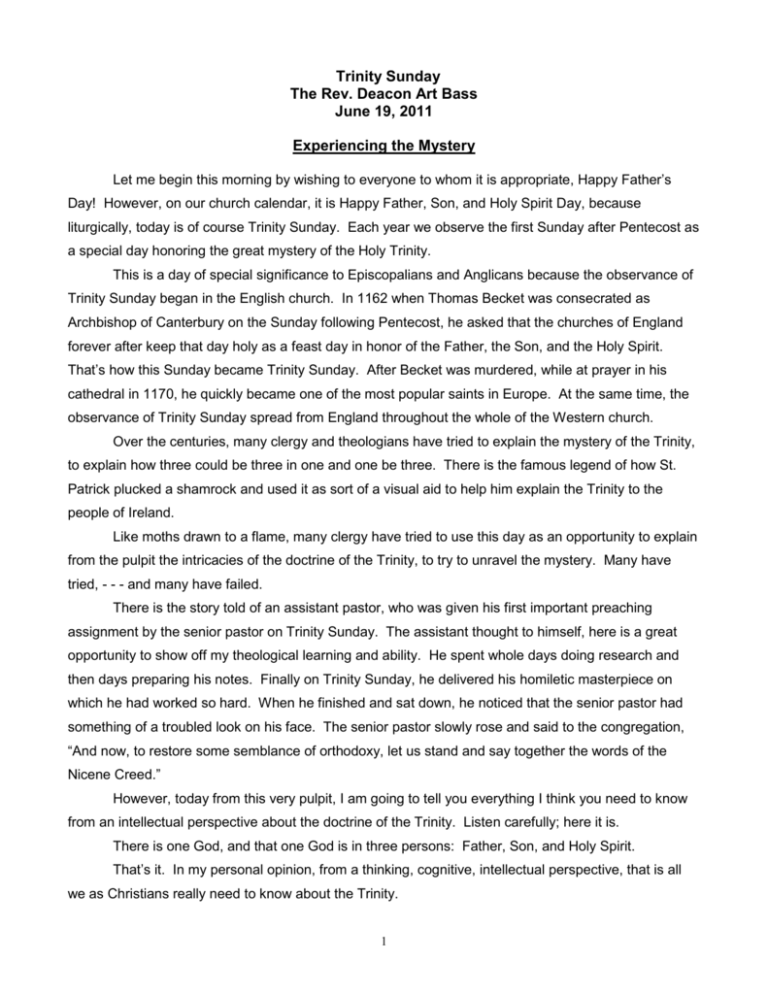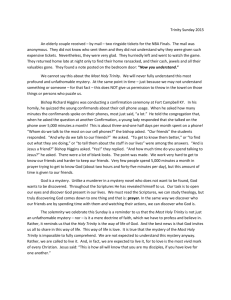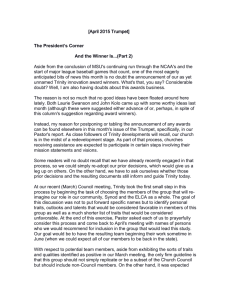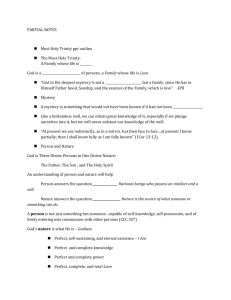Experiencing the Mystery
advertisement

Trinity Sunday The Rev. Deacon Art Bass June 19, 2011 Experiencing the Mystery Let me begin this morning by wishing to everyone to whom it is appropriate, Happy Father’s Day! However, on our church calendar, it is Happy Father, Son, and Holy Spirit Day, because liturgically, today is of course Trinity Sunday. Each year we observe the first Sunday after Pentecost as a special day honoring the great mystery of the Holy Trinity. This is a day of special significance to Episcopalians and Anglicans because the observance of Trinity Sunday began in the English church. In 1162 when Thomas Becket was consecrated as Archbishop of Canterbury on the Sunday following Pentecost, he asked that the churches of England forever after keep that day holy as a feast day in honor of the Father, the Son, and the Holy Spirit. That’s how this Sunday became Trinity Sunday. After Becket was murdered, while at prayer in his cathedral in 1170, he quickly became one of the most popular saints in Europe. At the same time, the observance of Trinity Sunday spread from England throughout the whole of the Western church. Over the centuries, many clergy and theologians have tried to explain the mystery of the Trinity, to explain how three could be three in one and one be three. There is the famous legend of how St. Patrick plucked a shamrock and used it as sort of a visual aid to help him explain the Trinity to the people of Ireland. Like moths drawn to a flame, many clergy have tried to use this day as an opportunity to explain from the pulpit the intricacies of the doctrine of the Trinity, to try to unravel the mystery. Many have tried, - - - and many have failed. There is the story told of an assistant pastor, who was given his first important preaching assignment by the senior pastor on Trinity Sunday. The assistant thought to himself, here is a great opportunity to show off my theological learning and ability. He spent whole days doing research and then days preparing his notes. Finally on Trinity Sunday, he delivered his homiletic masterpiece on which he had worked so hard. When he finished and sat down, he noticed that the senior pastor had something of a troubled look on his face. The senior pastor slowly rose and said to the congregation, “And now, to restore some semblance of orthodoxy, let us stand and say together the words of the Nicene Creed.” However, today from this very pulpit, I am going to tell you everything I think you need to know from an intellectual perspective about the doctrine of the Trinity. Listen carefully; here it is. There is one God, and that one God is in three persons: Father, Son, and Holy Spirit. That’s it. In my personal opinion, from a thinking, cognitive, intellectual perspective, that is all we as Christians really need to know about the Trinity. 1 In our modern, scientific age, whenever we are confronted with a mystery, we have a strong desire to solve that mystery. To simply let a mystery be, bothers us. Yet when it comes to religious mystery, Anglicans appear to be unique. We are often quite happy and content to let religious mystery be just that, a mystery. Take the presence of Christ in the Eucharist for example. Most Anglicans express belief that Christ is really present in the Eucharist, but very few will ever undertake to explain how that presence comes about. We prefer to leave that a mystery. Perhaps this is because of the great diversity for which we as a denomination are so famous. But I prefer to think that it is because we have learned that some things are better known and appreciated through experience than by any intellectual process. We know that Christ is present in the Eucharist because we experience that presence. We experience it collectively as a unifying presence in our church, and we experience that same presence individually as each of us leaves here empowered to love and serve the Lord in our daily life and work. So it is with the Trinity. We can accept and believe in the Trinity because of how we experience God, how we relate to God in our lives. Whenever a baby is born, when new life bursts forth everywhere each spring, we experience the creative power of God. When we are at our worst, when we are at our lowest, and sorely in need of a friend, we find God is there for us, to pick us up and forgive us, to bring redemption. We have all experienced this. Whenever the task before us appears to be too great, or the demands too many, we find a helper in God who empowers and sustains us. Creator, Redeemer, and Sustainer - - three distinct ways of experiencing God in our lives. Yet we know that all these blessings, all these experiences of the divine, as distinct as they are, come to us from the same God, the one God who loves and cares for us all. We know this through faith, and we know this because it is what we feel in ourselves. It is what we experience. So I think we need to let the Trinity be and remain a mystery. Holy mystery is a part of what makes God, God. It is a natural part of God’s being. We should simply appreciate and respect the mystery. And now to close, as St. Paul said in today’s epistle lesson – May the grace of the Lord Jesus Christ, the love of God, and the Communion of the Holy Spirit be with us all. AMEN 2





